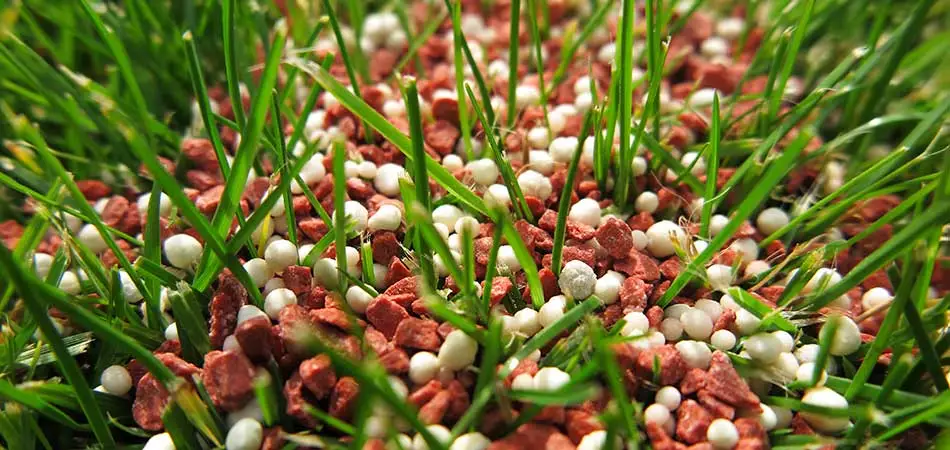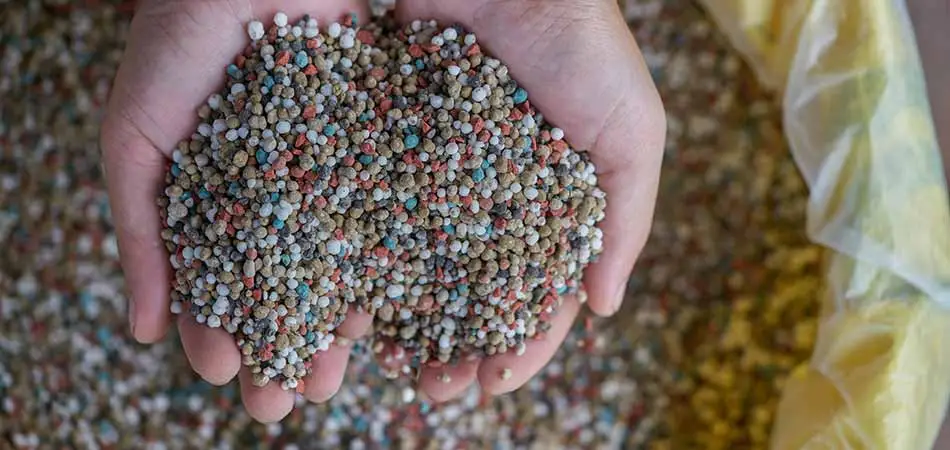Regular fertilizer service is an important way to keep your lawn well fed and strong enough to resist weeds and plant disease. Recently, many homeowners have become concerned with how fertilizer can affect the environment and have sought out more natural ways to feed their lawns.
There is a distinct difference between organic fertilizer vs. chemical fertilizer, including how it performs and how it is delivered to your lawn. Our experts know the ins and outs of the process and the products that are available and can answer any questions you may have.
Main Ingredients of Fertilizer Include Phosphorus, Nitrogen, & Potassium

Most fertilizer contains three main ingredients: phosphorus, nitrogen, and potassium. They are often mixed to different ratios for the time of year and type of grass. For example, starter fertilizer is often high in nitrogen to help promote a healthy root system.
Here is a quick breakdown of the main ingredients:
- Phosphorus - All plants need phosphorus to produce flowers and fruit. Adequate amounts of phosphorus also aid in root development.
- Nitrogen - Helps plants to grow quickly and develop seeds for reproduction.
- Potassium - Used to strengthen plants and encourage blooming.
- Other Ingredients - Other ingredients can include calcium, magnesium, and sulfur, with small amounts of iron, copper, manganese, boron, molybdenum, chlorine, zinc, and nickel.
Difference Between Chemical Fertilizer & Organic Fertilizer
With the growing environmental movement, some homeowners have sought out alternatives to help prevent damage to the ecosystem caused by chemical-based agricultural products. But what is the real difference between chemical fertilizer versus organic fertilizer?
Chemical fertilizer is exactly what it sounds like; it’s composed of the three main ingredients (plus some micronutrients) in chemical form. It is often delivered in a granular form about the size of rice grains. It is spread with a simple machine called a broadcaster or spreader. The chemical ingredients are produced in an industrial plant and are mixed and sold at supply houses or home improvement stores.
Organic fertilizer usually contains the same basic ingredients as chemical fertilizer, with the main difference being that they occur naturally. It is fairly difficult to guarantee the chemical composition of organic fertilizer because it isn’t man-made, which leads to mixed results for some gardeners. The phosphorus, nitrogen, and potassium are delivered via animal waste, compost, and sometimes bone and cottonseed meal, where they naturally occur.
Which Performs Better, Organic or Chemical Fertilizer?
Most industrial farm operations rely on exact ratios of the main ingredients in chemical fertilizer for best results. It’s pretty much understood that chemical fertilizer does a better job. The only trouble is that run-off from storms often brings traces of the chemicals into water supplies, which can harm wildlife and lower drinking water quality. The same can be said about using manure and compost, but the concentrations are often lower. If you have any questions about fertilization, our team is more than happy to answer them!
Organic fertilizer can be extremely effective when used properly, but because the naturally occurring chemicals found in compost and animal waste can vary, the results aren’t always consistent.
Call today for questions about fertilizer or to schedule an appointment.
If you have any further questions about which type of fertilizer is best for your needs, please call (515) 289-2020 today! We offer fertilizer service in Des Moines, West Des Moines, Ankeny, and the surrounding areas in central Iowa.





Comments (0)
Thanks for your comment!
Thanks for your feedback! Your comments have been successfully submitted! Please note, all comments require admin approval prior to display.
Error submitting comment!
There is a problem with your comment, please see below and try again.